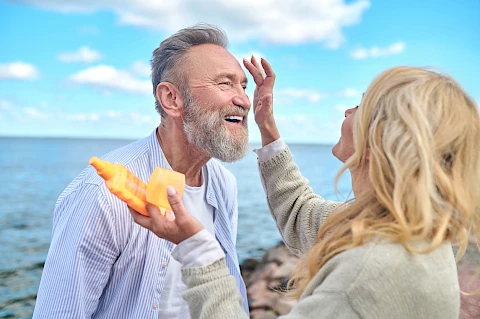
As we age, our skin becomes more sensitive and requires extra care, particularly when it comes to sun protection. The sun's harmful UV rays pose a significant risk to seniors. Learn some practical tips for sun safety for seniors and their caregivers from Senior Helpers Charlotte to ensure a healthy and active lifestyle.
The Risks of Sun Exposure
Senior skin is more sensitive to UV rays, putting you at heightened risk for sunburn and skin cancer. The potential health concerns from prolonged sun exposure cannot be overstated. As we age, our skin thins and loses some of its protective ability. Therefore, taking proactive sun protection measures is crucial for preventing further skin damage and health complications.
Why Sunscreen Is Crucial
Sunscreen is a crucial component of skin protection for seniors. Using a broad-spectrum sunscreen with an SPF of 30 or higher is recommended to ensure adequate protection against both UVA and UVB rays. To maximize its effectiveness:
- Apply sunscreen generously on all exposed skin about 30 minutes before heading outside.
- Reapply every two hours or more frequently if you're swimming or sweating.
- Opt for sunscreens formulated for sensitive skin to avoid irritation. Look for products labeled as hypoallergenic or for delicate skin.
Wearing protective clothing is one of the best ways to shield your skin from the sun. Consider incorporating hats with broad brims to offer shade for your face and neck, and sunglasses with UV protection to safeguard your eyes against harmful rays. Wear long-sleeved shirts and long pants made of lightweight, breathable fabrics that also offer UV protection.
When selecting clothing, look for materials with a high UPF (Ultraviolet Protection Factor) rating. These clothes block out a significant amount of UV radiation.
Timing Is Everything: Avoiding Peak Sun Hours
The sun is strongest between 10 a.m. and 4 p.m., known as peak sun hours. During this time, it's best to minimize sun exposure by planning outdoor activities for early morning or late afternoon. Seek shade when outside, especially during midday hours. Consider using umbrellas or canopies for additional shade when necessary.
Regular Skin Checks: Staying Vigilant
Regular skin checks are essential for detecting any concerning changes. To perform a self-examination, use a mirror to inspect all areas of your skin, including hard-to-see spots. Look for new growths, moles, or any changes in existing ones. Pay attention to sores that do not heal or changes in the texture and color of the skin. If you find anything unusual, consult a healthcare professional promptly. Regular check-ups with a dermatologist are encouraged to maintain skin health.
Discover Comprehensive Senior Care Services
Sun protection is a vital part of health management for seniors. You can safeguard your skin against harmful UV rays by incorporating strategies such as using sunscreen, wearing protective clothing, avoiding peak sun hours, and conducting regular skin checks. We urge seniors and their caregivers to prioritize sun safety in their daily routines. For personalized senior care and assistance in Charlotte, Pineville, and Concord, contact us at Senior Helpers Charlotte today to learn how we can help keep you safe and healthy.